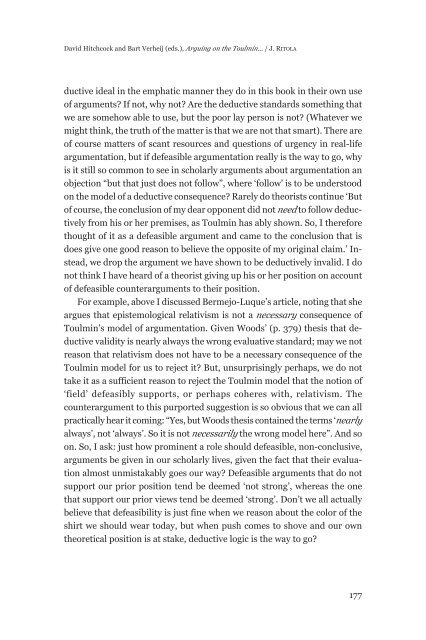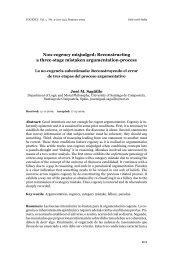Cogency v2 n2
Cogency v2 n2
Cogency v2 n2
Create successful ePaper yourself
Turn your PDF publications into a flip-book with our unique Google optimized e-Paper software.
David Hitchcock and Bart Verheij (eds.), Arguing on the Toulmin... / J. RITOLA<br />
ductive ideal in the emphatic manner they do in this book in their own use<br />
of arguments? If not, why not? Are the deductive standards something that<br />
we are somehow able to use, but the poor lay person is not? (Whatever we<br />
might think, the truth of the matter is that we are not that smart). There are<br />
of course matters of scant resources and questions of urgency in real-life<br />
argumentation, but if defeasible argumentation really is the way to go, why<br />
is it still so common to see in scholarly arguments about argumentation an<br />
objection “but that just does not follow”, where ‘follow’ is to be understood<br />
on the model of a deductive consequence? Rarely do theorists continue ‘But<br />
of course, the conclusion of my dear opponent did not need to follow deductively<br />
from his or her premises, as Toulmin has ably shown. So, I therefore<br />
thought of it as a defeasible argument and came to the conclusion that is<br />
does give one good reason to believe the opposite of my original claim.’ Instead,<br />
we drop the argument we have shown to be deductively invalid. I do<br />
not think I have heard of a theorist giving up his or her position on account<br />
of defeasible counterarguments to their position.<br />
For example, above I discussed Bermejo-Luque’s article, noting that she<br />
argues that epistemological relativism is not a necessary consequence of<br />
Toulmin’s model of argumentation. Given Woods’ (p. 379) thesis that deductive<br />
validity is nearly always the wrong evaluative standard; may we not<br />
reason that relativism does not have to be a necessary consequence of the<br />
Toulmin model for us to reject it? But, unsurprisingly perhaps, we do not<br />
take it as a sufficient reason to reject the Toulmin model that the notion of<br />
‘field’ defeasibly supports, or perhaps coheres with, relativism. The<br />
counterargument to this purported suggestion is so obvious that we can all<br />
practically hear it coming: “Yes, but Woods thesis contained the terms ‘nearly<br />
always’, not ‘always’. So it is not necessarily the wrong model here”. And so<br />
on. So, I ask: just how prominent a role should defeasible, non-conclusive,<br />
arguments be given in our scholarly lives, given the fact that their evaluation<br />
almost unmistakably goes our way? Defeasible arguments that do not<br />
support our prior position tend be deemed ‘not strong’, whereas the one<br />
that support our prior views tend be deemed ‘strong’. Don’t we all actually<br />
believe that defeasibility is just fine when we reason about the color of the<br />
shirt we should wear today, but when push comes to shove and our own<br />
theoretical position is at stake, deductive logic is the way to go?<br />
177








